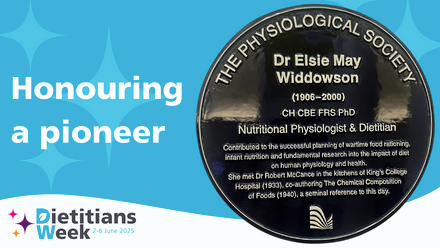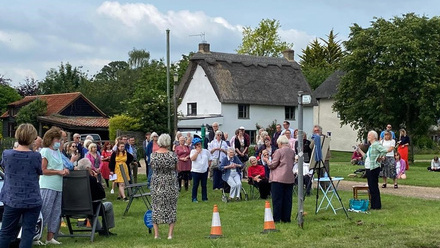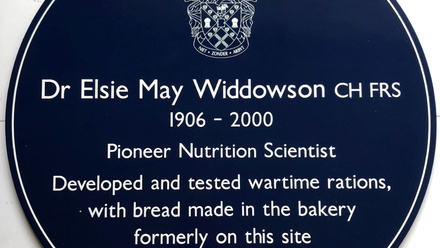by Angela Madden.
It is a tremendous honour to have been invited to give this year’s Elsie Widdowson Memorial Lecture – a big thank you to the BDA General and Education Trust who support and organise this.
The lecture recognises and celebrates the preeminent pioneer of human nutrition whose work stretched across many decades and who made a major contribution to the knowledge and understanding of nutrition science and its role in dietetics.
Following in the footsteps of insipiring dietitians
Even today, almost 90 years after she started work, Elsie Widdowson’s research findings underpin much of our understanding about food and body composition and dietary requirements. Indeed, this gives us much to celebrate and to inspire current and future dietitians.
Being invited to give the lecture is also a great honour because I will be following in the footsteps of a small number of dynamic and inspiring dietitians who have delivered fascinating lectures and contributed so much through their own work. It is a huge testament to the spirit of UK dietetics that so many of them have contacted me, offering support, good wishes and much welcome ideas!
The content of the lecture is the choice of the person invited to deliver it – an awesome opportunity to speak to so many members of the profession but… where to start and how to do justice to Elsie Widdowson’s memory?
Hoping for inspiration, I reached for my copy of Dr Margaret Ashwell’s A Scientific Partnership of 60 Years which describes the lives and work of Elsie Widdowson and Professor Robert McCance. I bought the book when it was newly published and I was just starting my PhD and, must confess that the cover photos taken on a mountaintop in the Lake District were part of the part of the appeal – scientists who climb: a metaphor for taking on challenges!
Dietetics is challenging in so many respects. It is firmly based in scientific evidence but bridges from that evidence to its application in working with people to facilitate improvements in health and wellbeing.
Considerable progress
It’s nearly 90 years since Elsie Widdowson’s scientific career started and nutritional science has progressed considerably. In spite of this, our ability to assess nutritional intake still continues to advance and our use of behaviour change skills remains a work in progress. At the same time, the voices in the public domain talking loudly about food, diet and health are often from non-experts and frequently include dubious and sometimes dangerous messages.
A frustration for well-qualified dietitians and yet, in spite of our expertise, we don’t have a monopoly on dietary matters.
And so, my ideas have started to develop around the theme of the challenges of dietetics and especially how we might be able to approach them by harnessing our curiosity, asking questions and being critical.
My plan is to look at examples of dietetics where practice has changed considerably within recent decades as evidence has increased and traditional practice has been reviewed and sometimes completely changed. I’m hoping to squeeze in some liver and biliary disease (my own clinical background), a little enteral feeding and might touch on examples from renal and diabetes. I want to stimulate ideas about how dietitians initiate, engage in and lead developments in practice and where this might lead us in the future.
Lots of work to do and thoughts to develop but I will do my best to keep to time, keep the audience awake and do justice to the great honour I have been given in being invited to deliver the 2019 Elsie Widdowson Memorial Lecture!




